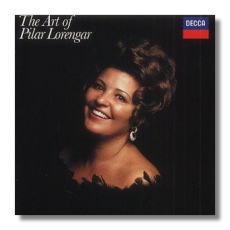
The Internet's Premier Classical Music Source
Related Links
- Latest Reviews
- More Reviews
-
By Composer
-
Collections
DVD & Blu-ray
Books
Concert Reviews
Articles/Interviews
Software
Audio
Search Amazon
Recommended Links
Site News
 CD Review
CD Review
The Art of Pilar Lorengar

Arias & Songs by Puccini, Dvořák, Mozart, Charpentier, Bizet, Richard Strauss, Wagner, Granados, Falla & Turina
Pilar Lorengar, soprano
Various accompaniments
Decca 473317-2 ADD/DDD 2CDs: 77:00, 77:23
This is a happy surprise from Decca, as Pilar Lorengar never captured the general public's attention as much as her more famous contemporaries did. I'm not sure why, as she was a sensational and versatile singer, and also a beautiful woman. (Unfortunately, she passed away in 1996.) Perhaps her decision to base her career at the Deutsche Oper in Berlin prevented her from being internationally reckoned as the treasure she was.
Lorengar's birthplace was Zaragoza in Spain; she was born in 1928. Her early career was devoted to performing zarzuelas, the operettas of her homeland. In the mid-1950s, she expanded her repertoire to more traditional operatic roles, and was engaged to sing Mozart's Cherubino at the Aix-en-Provence Festival. From there, she was invited to sing at Glyndebourne, Covent Garden, and Salzburg, and she gained the reputation of a Mozart specialist. In the 1960s, heavier roles (Verdi, Puccini, and even some Wagner) appeared in her repertoire, although her Metropolitan Opera debut in 1966 took her back to Don Giovanni's Donna Elvira, and she remained a predominantly lyric soprano. Her complete roles on record include Violetta in La traviata (a souvenir of her Deutsche Oper years), Fiordiligi (Così fan tutte), Pamina (Die Zauberflöte) and the Countess (Le nozze di Figaro). Her last recital was in 1983, when she shared the stage with Plácido Domingo.
The earliest recordings included here date from 1966, from a fine aria disc that she made with conductor Giuseppe Patané. Operatic excerpts from her 1971 disc with Walter Weller and a 1978 disc with Jesus López-Cobos are here too. Over this span, there is no deterioration in the quality of Lorengar's voice. Her Mozart recordings with Sir Georg Solti are recalled by "Ach, ich fühls" and "Come scoglio." The second CD is devoted entirely to music by Spanish composers. Lorengar is joined by beloved pianist Alicia de Larrocha for three sets of songs by Granados: the Tonadillas, the Canciònes amatorias, and Las majas dolorosas. (It is unfortunate that Decca did not supply texts and translations for these relatively unfamiliar works.) These were recorded in 1977. The second CD is rounded out with excerpts from Falla's La vida breve and Granados's Goyescas, and with four songs by Turina.
Lorengar was a lyric soprano who was convincing in dramatic roles – sort of like Angela Gheorghiu turned around 180 degrees. Her rapid vibrato, particularly above the stave, added a distinctive and not unpleasant color. She seemed to identify with the more plaintive heroines; her Mimì, Liù, Butterfly, and Suor Angelica are particularly moving. There was nothing affected about her singing, however. The Spanish songs are performed with a naturalness that hints at Lorengar's skill in the recital hall as well as in the opera house. In short, these CDs are filled with nothing but beautiful singing and a winning modesty.
Lorengar's partners are first class, and the recordings – many of them new to CD, I believe – feature excellent sound. Decca has assembled this compilation with affection and care; the only black mark is the lack of sung texts, as mentioned above.
Copyright © 2003, Raymond Tuttle


















